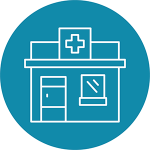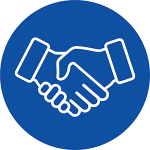The Family Care Project: Creating Autism Access for Culturally Diverse Families
TRANSLATIONAL SCIENCE BENEFITS MODEL PROFILE

TRANSLATIONAL SCIENCE BENEFITS MODEL PROFILE

Early, specialized support is important for helping young autistic children learn and develop. However, families from different cultural backgrounds often find it challenging to access needed services. The UW READi Lab partnered with a non-profit community organization, Mother Africa, to create a new way for diverse families to access autism services.
We used a co-design approach with Mother Africa to identify their needs and potential strategies for increasing their autism awareness and identifying potential supports. We obtained feedback from a variety of people involved in autism care, including Mother Africa service providers, community leaders, and caregivers. Twenty-three individuals participated in eight co-design sessions that were two hours each. Participants were from different language groups, including Somali Mai Mai, Swahili, Arabic, Dari/Pashto, French, Amharic, and Tigrinya. These sessions helped us identify five important strategies for improving access to needed services: reducing stigma around autism; being mindful about cultural differences between groups; empowering caregivers; providing information and support for accessing services; and ensuring that the services were practical for use.
Based on what we learned from these conversations, we developed a new pathway for families to access autism care, which we called “The Family Care Project.” These materials were vetted by the Mother Africa participants and revised as needed. The final version provided suggestions for caregivers about navigating the medical and educational systems, as well offering culturally-appropriate strategies for parenting autistic children and maintaining their own self-care. These materials were specifically designed for use within this non-profit community-based organization and were translated into the six languages commonly spoken by Mother Africa communities. Non-profit organizations often have trusting relationships with diverse families, making them an ideal setting for the program. This project shows how working together with communities can create more fair and effective ways to provide autism support.
We also tested how effective this new pathway was for connecting families to services, and whether people without medical training could use the Family Care Project materials with families. Six non-profit workers who speak Swahili, Amharic, Tigrinya, Dari, Arabic, Somali MaiMai, and French, completed a self-paced, web-based training about how to use the Family Care Project. After completing the training, they delivered the curriculum across four sessions to 35 families who have children with increased autism likelihood. When the test project ended, community caregivers reported that families had used the used autism services. The non-profit workers also felt that the program was easy to use and fit with their current roles at Mother Africa. Family members said the Family Care Project helped both them and their families.
The Family Care Project is a low-cost educational and navigation service that was easy for providers to use, relevant for families, and supports caregiver and child well-being. The Family Care Project has the potential to increase the ways that families with young children at elevated likelihood for autism can connect to services that improve outcomes for their children. We hope the materials can be tailored to fit additional cultural groups and thereby support an even greater number of underserved families and communities.
Additionally, this project may also serve as a model for future research using co-design and task-shifting approaches. By developing a power-sharing partnership with Mother Africa, this project showed how academic-community relationships can help solve problems in ways that best match the needs of the communities they serve.
The study team created reproducible guidelines and educational materials that support caregiver and child well-being in culturally and linguistically diverse communities.
Demonstrated.

Guidelines
Definition: Formal recommendations or principles to assist with patient care for specific clinical circumstances. Guidelines are issued by professional organizations, government agencies, and nonprofit organizations (e.g., American Academy of Pediatrics, American Medical Association, World Health Organization, U.S. Preventive Services Task Force).
Rationale: Guidelines promote quality and effectiveness of health care services and procedures. Development of guidelines is based on extensive and systematic review of the literature to provide the evidence to support recommendations. Guidelines can serve as helpful evidence of translational research efforts that translate into improved health care services and procedures.
The training program promoted the use of evidence-based procedures for providers to use while discussing difficult topics with families
(e.g., validation, reinforcement).
Demonstrated.

Therapeutic Procedures
Definition: Methods and techniques that pertain to interventions, treatment, or prevention of diseases, disorders, or conditions. Therapeutic procedures are performed to improve a diagnosed health concern. They encompass a variety of procedures, ranging from the administration of prescription drugs to surgical procedures to psychotherapy.
Rationale: Therapeutic procedures that improve efficiency and/or efficacy can improve the quality of health care, and reduce long-term costs.
The study team produced a 40-page workbook translated into six languages for use with CLD families to facilitate early autism.
Demonstrated.

Equipment & Supplies
Definition: Apparatus, instruments, and materials for diagnostic, surgical, therapeutic, and scientific procedures. Equipment
and supplies include scientific instruments used for basic discovery and clinical applications.
Rationale: Improvements in basic scientific instruments enhance the capacity of clinical researchers to make discoveries.
Improvements in medical equipment translate scientific advances into improved patient outcomes by reducing instrument
fatigue, improving recovery times, and reducing risk of injury.
The Family Care Project created resources for community providers and caregivers to use to support CLD children who have social-communication delays or autism.
Demonstrated.

Community Health Services
Definition: Diagnostic, therapeutic, and preventive health services provided for individuals in a community. Examples include
clinics, tobacco cessation, or mobile mammography vans.
Rationale: Community health services can substantially impact the population health of a community and involve community
members, researchers, and physicians working together to provide services that benefit the community.
The Family Care project was a collaborative effort that created culturally and linguistically appropriate resources to promote families’ understanding of child behavior and health care.
Demonstrated.

Health Education Resources
Definition: Educational resources that lead to the improvement of health of individuals, populations, or communities. These often take the form of websites, toolkits, and print materials promoting health programs and activities that individuals themselves can do to improve their health, including resources for healthy recipes & active living.
Rationale: Heath education resources serve as potential evidence of knowledge translation to patients and the community. They also serve as preventive strategies that go beyond scientific translation by informing patients and community members of health benefits and risks through audience-targeted delivery and execution.
This project facilitated access for CLD families to healthcare and education.
Demonstrated.

Health Care Acceessibility
Definition: Increased equity and ability for all to gain entry to and to receive services from the health care system, regardless of race, ethnicity, age, income, ability, sex, gender, sexual orientation, geographic location, or health status. Access to health care consists of three core elements: access to the health care system (through insurance coverage), services located nearby, and access to a provider with whom the patient trusts and can communicate.
Rationale: Health care accessibility increases the impact of translational science by helping innovations reach as many people as possible, especially vulnerable, at-risk populations. Strategies that enhance health care accessibility demonstrate coordinated translational science efforts among scientists, health care providers, insurers, government regulators and the community to optimize community health outcomes.
Our project models new public health practices for developmental surveillance of underserved young children.
Potential.

Public Health Practices
Definition: Organization or delivery of public health services benefits to communities or populations. Examples include routine public health surveillance, emergency response activities such as contact tracing during disease outbreaks, and program evaluation.
Rationale: Public health practices apply scientific knowledge to improve the health of a specific community through activities to reduce the incidence and severity of diseases and injuries. Public health practices are typically designed to benefit the community from whom information is gathered.
Early detection of autism and supplying specialized services has been shown to improve the quality of life for both affected children and their families.
Potential.

Life Expectancy & Quality of Life
Definition: Improvement in the average age of death or how often illness and injury impedes everyday life for a particular population. Life expectancy measures how long a person can expect to live. Quality of life can be measured in terms of living conditions, physical health, mental health, social relationships, level of independence, economic security, safety, or basic human rights.
Rationale: Enhancement of well-being among community members is a key goal of clinical and translational research. Increases in life expectancy and quality of life are frequently used to assess community health.
We built capacity for health care delivery using lay providers within the setting of a non-profit organization.
Demonstrated.

Health Care Delivery
Definition: Improved provision and distribution of health services to a patient population. Delivery systems typically include healthcare providers, insurers, and government regulators. Health care delivery is measured in terms of cost, method of payment, regulation, and quality of care.
Rationale: Effective and efficient mechanisms to deliver health services to a target population require transdisciplinary collaboration and widen the impact of evidence-based medicine and health practices.
The cost of establishing the program will be far less than the burden of the condition on parents and caregivers.
Potential.

Cost Effectiveness
Definition: Improvement in the benefits of a program relative to its cost. Cost-effectiveness analysis takes into account differences in medical costs, productivity, health outcomes with and without the intervention in place. Cost-effectiveness can be assessed for drugs, devices, programs, or other services.
Rationale: Cost effectiveness is used as an analytic tool to assess which medical care should be provided by comparing the cost and effectiveness of different interventions. It helps to inform healthcare decision-making as to allocation of funding and finding ways to deliver healthcare more efficiently.
As some medical burdens shift to social costs, this project has the potential to increase the quality of life and decrease barriers to early identification and treatment.
Potential.

Societal & Financial Cost of Illness
Definition: Reduced social and economic costs of acute or chronic disease or other health conditions. Examples include general productivity losses, reduced quality of life, and lowered resources.
Rationale: New procedures, interventions, policies, and other benefits from translational science hold the potential to alleviate undue societal and community burden, provide opportunities for reallocation of resources, and increase quality of life.
The Family Care project has the potential to decrease the cost of treating children with autism into adulthood through early diagnosis and provision of resources.
Potential.

Cost Savings
Definition: Reduced financial costs of services or goods to providers or consumers. Examples of healthcare cost savings include generic drugs, at-home testing kits, or advances in surgery techniques or equipment that allow procedures to be done at outpatient facilities.
Rationale: Cost savings for patients, medical professionals and scientists from scientific research constitute direct benefits that are measurable through comparing costs of newly developed and established drugs, procedures, and other interventions. For example, less expensive but equally effective drugs developed through translational science lower purchase costs for patients and decrease disparities in access to care.
This project is likely to result in publishing scientific papers.
Potential.

Scientific Research Reports
Definition: Non-technical, evidence-based documents geared toward audiences who intend to use the information for policy/behavioral change. Target audiences include practitioners, policy makers, public health educators, and the general public. Examples include but are not limited to reports published by the National Institutes of Health, Institute of Medicine, or the Robert Wood Johnson Foundation.
Rationale: Ranging from identification of health problems to intervention evaluation summaries, these documents often provide actionable recommendations based on scientifically-derived findings.
The Family Care project built upon the strengths of the research community and the expertise of community members connected to Mother Africa.
Demonstrated.

Community-Engaged Research (OHSU defined benefit)
This project is likely to promote the careers of two young investigators.
Potential.

Career Access (Duke defined benefit)
This research has clinical, community, economic, and policy implications. The framework for these implications was derived from the Translational Science Benefits Model created by the Institute of Clinical & Translational Sciences at Washington University in St. Louis.
Pilot project funding was provided by the Institute of Translational Health Sciences headquartered at the University of Washington, NIH Grant UL1 TR002319.
Shana Attar, MS and Hannah Benavidez, MS Wendy Stone, PhD
READi Lab (https://uwreadilab.com/), University of Washington
Community Partners:
Carol Gicheru, BA, Colleen Alabi, MS, Risho Sapano, MS
Mother Africa (https://www.motherafrica.org/)


